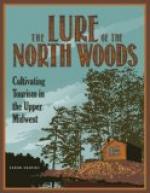“Then we had better get down,” said Thirlwell. “The boys don’t seem to have started to cook breakfast, and I want to pull out soon.”
He was turning away when Drummond stopped him, stretching out his arm. “Hold on! What’s that yonder?”
“Mist,” said Thirlwell, impatiently.
“No; it’s too dark. Look again!”
Thirlwell started. The mist was drifting past the detached clump of pines his companion indicated, but its color was silvery, and he now noted a faint blue streak. This was something of a shock, for he had thought there was nobody but his party in the neighborhood.
“Smoke!” he exclaimed. “Go down as fast as you can and tell the boys not to make a fire.”
When Drummond went off Thirlwell sat down and watched the smoke. It got plainer, and rose in a thick blue cloud when the mist rolled away. Somebody was cooking breakfast and the volume of smoke indicated a large fire. It looked as if there were a number of men to be fed, and Thirlwell had not expected to find Indians near the spot just then. After a time, the smoke died away and he went back to camp, but told Agatha nothing about what he had seen. When breakfast was over he took one of the Metis and plunged into the bush. There was not much need for caution, because the party would, no doubt, set off when they had finished their meal, and if they were Indians, it did not matter if he met them. But he did not think they were Indians.
When he had gone a mile or two, he stopped at the edge of a muskeg and sent the Metis on to a clump of pines on the other side. The man, keeping in the shadow, stole round the swamp, and vanished noiselessly in the underbrush. After a time, he reappeared, beckoning, and Thirlwell knitted his brows when he joined him.
The ashes of a fire smoldered between two hearth-logs; white chips and broken branches were scattered about. Near his feet were six small round holes, spaced in a regular pattern, and a cotton flour-bag and some empty cans lay beneath a bush.
“A white man’s camp; they had a tent,” he said.
“Sure,” agreed the Metis. “Teepee poles they not mak’ hole lak’ dat.”
“Well, I reckon a sour-dough prospector wouldn’t have bothered about a tent. Looks as if one of them was a tenderfoot. Qu’en pense-tu?”
The Metis’ keen eyes had wandered round the camp and he nodded. “But, yes! Dat man sait vivre; he lak’ it comfortable.”
“A city man!” Thirlwell remarked, with a frown. How many packers?”
“Quat,” said the Metis.
“Voyageurs?”
The Metis laughed scornfully as he indicated the trampled brush, broken branches, greasy papers, and scraps of food. “Me, I think no! Railroad outfit. Voyageur not muss up camp lak’ dat.”
Thirlwell agreed. A half-breed voyageur does not waste food, and with inherited caution seldom disturbs the bush. It looked as if the city man had engaged a gang of track-layers, who are used to pioneering and sometimes carry surveyors’ stores through the wilds.




